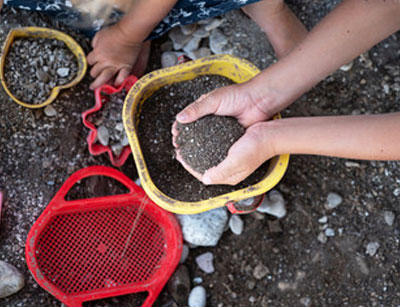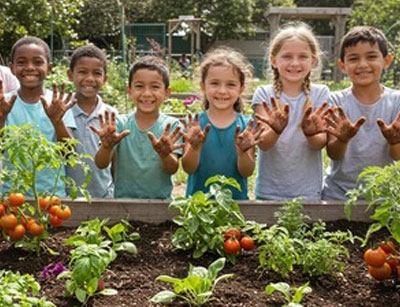
Lead can harm your child. Dirt around your home could have lead in it. Keep your child safe from lead in dirt:
- Wash your child’s hands and toys often. Always wash hands before eating or sleeping.
- Take off shoes or wipe them on a doormat before going into your home.
- Cover bare dirt outside where your child plays. Use grass or other plants, bark, gravel, or concrete.
- Cover bare dirt outside where your child plays. Use grass or other plants, bark, gravel, or concrete.
Call your local lead poisoning prevention program to find out about testing the dirt around your home for lead. Lead poisoning can make it hard for your child to learn, pay attention, and behave. Talk to your child’s doctor about testing your child for lead. Most children who have lead poisoning do not look or act sick. The only way to know if your child has lead poisoning is for your child to get a blood test for lead
EPA Guidelines for Minimizing Lead Contamination and Exposure in Soil

Before establishing a community garden or recreational space, it is crucial to investigate the historical land use of your property and its surroundings. To mitigate lead exposure in soil, consider the following recommendations:
- Apply a thick layer of clean soil, vegetation, mulch, or other materials to cover contaminated soil.
- Restrict access to highly contaminated areas.
- Prevent soil from entering indoors by using doormats, removing shoes, and following lead-safe cleaning methods.
- Maintain proper hygiene for outdoor pets to reduce exposure risks.
- Thoroughly wash produce, peel root vegetables, and discard outer leaves of leafy greens. Alternatively, opt for ornamental plants instead of edible crops.
- Wear gloves or wash hands and exposed skin areas after handling soil.
- Wash clothes separately if they come in contact with soil or dust.
- Supervise children to prevent them from playing in bare soil or ingesting it.
- Clean toys and pacifiers regularly.
- Avoid planting food crops near buildings where lead concentrations may be higher.
- Construct raised beds filled with uncontaminated soil for growing crops in more polluted areas.
- Seek assistance from lead abatement professionals to remediate or cover contaminated soil effectively.